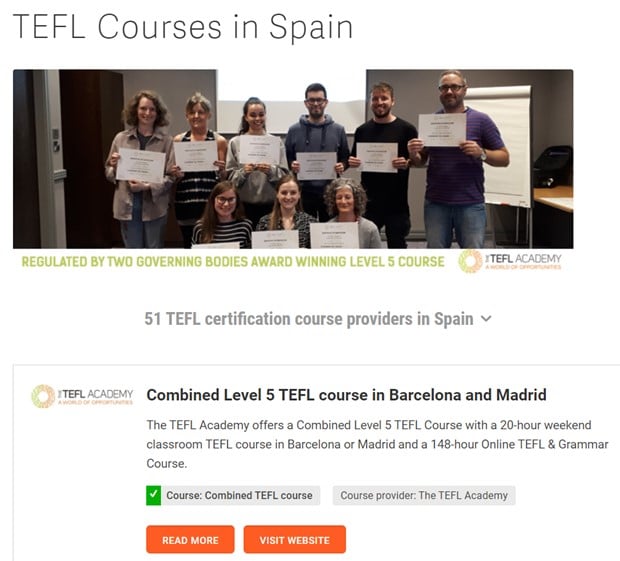
Teaching English in Spain can be a great way to be able to stay legally in the country.
Especially as the English language market is growing quite fast.
That being said, there are certain qualifications you will need to teach English in Spain, with fewer requirements needed if you are from an EU country and more if you are not.
Fluent in English
While it is not necessary to come from an English-speaking country, you must of course be fluent in the language.
While your own English language skills will probably not be tested, although your teaching skills might, a Spanish school, language school or company will not hire you if your English is heavy-accented or if you make many grammatical mistakes.

A bachelor’s degree
While having an undergraduate degree in Education or English is not required, and a bachelor’s degree itself is not legally required either, if you have one you will be eligible for much higher paying jobs.
It does not matter what field your degree is in either.
It could be political science, like mine, history, geography or even art. One Spanish friend joked and told me “even underwater basket weaving would be fine as long as you have a degree”.

Teaching certification
A TEFL certificate (Teaching English as a Foreign Language), a CELTA (Certificate in English Language Teaching for Adults) or a TESOL (Teaching English to Speakers of Other Languages) are the three certificates most people who teach English overseas hold.
You can take one of these courses in your home country or elsewhere before you arrive in Spain (make sure the course offers teaching practice if you do).
You can also take a course in Spain as the country has a wide variety of language schools offering them. ESL base has a list of 53 TEFL courses in Spain, you can browse CELTA courses here, and TESOL Spain has a large listing of schools for the TESOL.
There are also online courses offering all three of these certifications but, as online courses do not offer teaching practice, some schools and companies hiring English teachers will not accept these certificates.
None of these certificates are mandated by Spanish law in order to get an English teaching job but, again, the more qualifications you have the more jobs will be open to you.
Teaching experience to teach in Spain
While those who already have teaching experience may find themselves being offered more jobs, teaching English in Spain doesn’t often require experience.
If you want to get experience at a school in your own country, or by tutoring students in English before you arrive in Spain, however, it certainly cannot hurt.

Finding a teaching job in Spain
Of course, you will also need to find a job teaching English in Spain. This should be done before you worry about visas and work permits, as only your employer can apply for them for you.
You can find English teaching jobs in Spain via Glassdoor, Indeed Spain usually has teaching job listings and both ESL Base and Dave’s ESL Cafe always have job listings in various areas in Spain.
All of these sites have hundreds more available jobs right before peak hiring season (September and January).
Visas and work permit to be able to teach in Spain
If you are a citizen of an EU country, you will not be required to have a visa or a work permit. Instead, you will just need to move to the area of Spain you are interested in, register yourself with the authorities there and begin looking for jobs.
If you are not a citizen of an EU country, you will need a national visa (visado nacionale) in order to be able to legally teach English.
It is not possible for you to apply for your own visa and work permit, however, as Spanish law does not allow that. Instead, your employer will apply for them once you have accepted a teaching job.

This is why it is much more difficult to teach English in Spain if you are not an EU citizen.
After all, obtaining a work permit can take between six months and a year, and many Spanish language schools, government and private schools and companies are not willing to sponsor a non-EU citizen for a work permit when an EU citizen does not need one.
This is the main reason why so many non-EU citizens teach English in Spain illegally.
That also comes with its own set of problems, however, as if you are caught you will be asked to leave Spain.
You will also be paid in cash under the table, so will not be eligible for health insurance, sick leave, paid holidays or pensions.

When to look for English teaching jobs in Spain
Most of the hiring for English teaching jobs in Spain begins in August or September with many teaching jobs starting in October.
January is also another month where you will see many more listings for teaching jobs.
Plan to arrive in the country in mid-August at the latest and mid-December for jobs being advertised in January.
This will give you a chance to find an apartment, settle in and then be ready to apply for jobs as soon as the new hiring season for English teachers in Spain begins.



